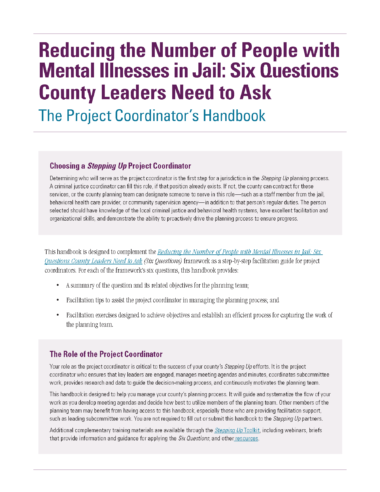Reducing the Number of People with Mental Illnesses in Jail: Six Questions County Leaders Need to Ask
Released by Stepping Up: A National Initiative to Reduce the Number of People with Mental Illnesses in Jail, this report is intended to assist counties with developing and implementing a systems-level, data-driven plan that can lead to measurable reductions in the number of people with mental illnesses in local jails. The report serves as a blueprint for counties to assess their existing efforts to reduce the number of people with mental illnesses in jail by considering specific questions and progress-tracking measures.
The Project Coordinator’s Handbook is designed to assist counties in applying the Six Questions framework. This step-by-step facilitation guide will help project coordinators develop systems-level plans to achieve their Stepping Up goals. For each of the framework’s six questions, the handbook provides:
- A summary of the question and its related objectives for the planning team;
- Facilitation tips to assist the project coordinator in managing the planning process; and
- Facilitation exercises designed to achieve objectives and establish an efficient process for capturing the work of the planning team.
Download a Word document of the exercises in the handbook.
The sharp rise in school shootings over the past 25 years has led school officials across the U.S.…
Read MoreA three-digit crisis line, 988, launched two years ago to supplement—not necessarily replace—911. Calling 988 simplifies access to…
Read More Taking the HEAT Out of Campus Crises: A Proactive Approach to College Safety
Taking the HEAT Out of Campus Crises: A Proactive Approach to College Safety
The sharp rise in school shootings over the past 25 years has led school officials across the U.S. to take a closer look at ways to keep students safe. For Chaffey College in Rancho Cucamonga, California, a tragic incident at a nearby university hit close to home and spurred campus leaders to revisit their own school’s threat assessments and crisis responses.
Read More From 911 to 988: Salt Lake City’s Innovative Dispatch Diversion Program Gives More Crisis Options
From 911 to 988: Salt Lake City’s Innovative Dispatch Diversion Program Gives More Crisis Options
A three-digit crisis line, 988, launched two years ago to supplement—not necessarily replace—911. Calling 988 simplifies access to services when people are seeking help for themselves or loved ones with suicidal thoughts, behavioral health concerns, or substance use-related crises.
Read More Matching Care to Need: 5 Facts on How to Improve Behavioral Health Crisis Response
Matching Care to Need: 5 Facts on How to Improve Behavioral Health Crisis Response
It would hardly be controversial to expect an ambulance to arrive if someone called 911 for a physical health emergency. And yet, for years, the default responders for a behavioral health emergency have been law enforcement officers, not behavioral health professionals.
Read More











